How to Store A Gun to Prevent Rust
Essential Techniques for Preventing Rust on Your Gun.
Gun ownership is a significant responsibility, and proper storage of firearms is essential to gun ownership. One of the most common issues gun owners face is the formation of rust on their guns, which can cause damage over time. Rust is formed when metal is uncovered to moisture and air, leading to corrosion, dent, and even firearm malfunction.
Therefore, knowing how to store guns to prevent rust formation is crucial. This article will explore tips for avoiding rust formation. These tips include:
- Thoroughly cleaning your weapons.
- Applying a gun oil or rust inhibitor.
- Storing them in a dry environment.
- Using a gun safe.
- Rotating your weapons.
By following these guidelines, you can maintain your firearms in optimal condition, prevent rust formation, and guarantee the longevity and dependability of your guns.
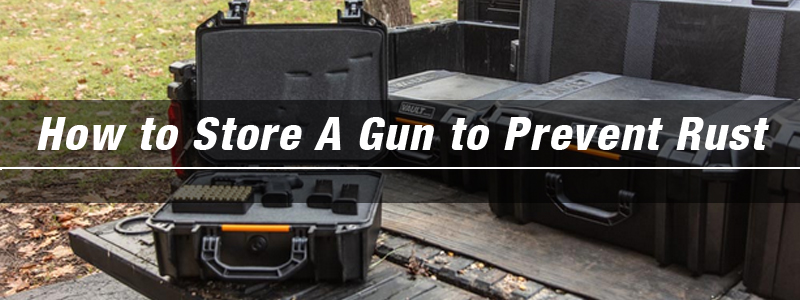
Rust is a common issue that gun owners face and can cause significant damage to firearms. Moisture, oxygen, and metal are the three components that lead to rust formation, regardless of the material from which the gun is made. However, this doesn't mean rust is inevitable; proper storage practices can help prevent it. Investing in proper gun storage and following key rust prevention practices can ensure your firearm stays in top condition and performs accurately every time it's deployed. Therefore, knowing how to store your gun to prevent rust is essential. By doing so, you can preserve your gun's longevity and maintain its reliability.
Put it in the Right Case
First up: choose the right gun case. Your case is the most crucial defender against the severe oxidation of environmental accelerants like moisture, dirt, and salt. Storing your gun in the appropriate pistol case (or the right rifle case for all you hunters and sport shooters) is clutch to sealing out those compounds. Pelican makes some of the very best watertight gun cases to prevent rust.

So what kind of gun case is the most rust-proof, you ask? You need a foam-padded and hard-sided case to protect your firearm from abrasion, but you also need watertight and dustproof to defend against rust-causing particles in the air. Pelican gun cases also feature special pressure equalization valves that bar water, dust, and dirt from entering. Plus, O-ring seals provide added defense against water penetration.
Store it in the Right Place.
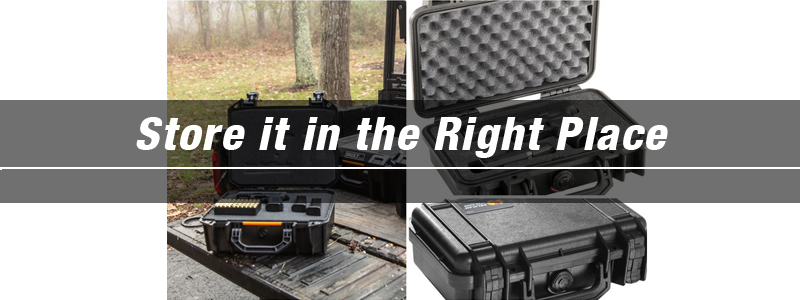
While your case is a solid first defense against common rust triggers, the environment in which you store your gun matters, too. Firearm experts recommend paying close attention to the temperature and humidity in the room where your case or safe is stored. The key is to keep it in a place that won't accelerate the oxidation process. With these conditions in mind, it's important to avoid keeping your firearms in damp locales — the garage, the basement, the bathroom, the shed, and the camper are all off-limits. To closely monitor the moisture in the room, you can invest in an affordable humidity meter, widely available for under $15.
Other Tips for Preventing Rust
Storing your weapons in the right environment is an important first step toward rust prevention. Still, there are some other things to keep in mind to slow or inhibit the oxidation process completely.
Keep your gun clean.
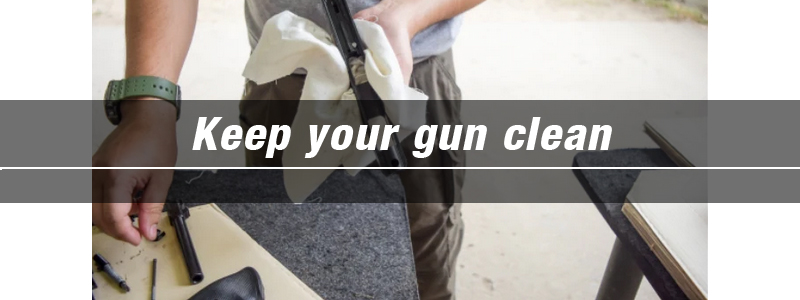
The microscopic particles in the atmosphere, including salt molecules, can accumulate on metal surfaces. At the same time, dirt and dust particles can destroy the surface and cause rust spots to grow and flake. Regularly cleaning your firearm is a proactive measure to prevent rust formation.
Avoid corrosive ammunition.
Corrosive ammo may have potassium chlorate primers, which decompose into sodium chloride (salt), and we all know that salt is the best thing to throw at metal if you want it to rust fast. If you use this type of ammunition, cleaning your firearm after every visit to the range is advisable.
Use best quality range bags for ammunition storage.
Prevent High Humidity
Preventing high humidity is crucial in avoiding rust formation on your firearms. High humidity can cause moisture to accumulate on metal surfaces, leading to rust formation. Storing your guns in a dry environment with low humidity is important to prevent high humidity. In regions with naturally high humidity levels, such as coastal areas or basements, Using a dehumidifier effectively reduces the air's moisture content and prevents rust on your firearms. Another way to avoid high humidity is to keep your guns well-ventilated by storing them in a location with good air circulation. This can help prevent moisture buildup around your firearms and reduce the risk of rust formation. It's also important to avoid storing your guns in damp areas, such as near a window or in a basement prone to flooding. By preventing high humidity levels around your weapons, you can significantly reduce the risk of rust formation and ensure the longevity and reliability of your firearms.
Prevent Water contact
Preventing water contact is another essential step in avoiding rust formation on your firearms. Water can cause significant damage to guns, especially if left in contact with metal parts for an extended period. Storing your weapons in a dry location away from water sources, such as plumbing or leaky roofs, is important to prevent water contact. If you must transport your guns, ensure they are properly wrapped and protected from rain or moisture. When cleaning your guns, be careful not to get any water on the metal parts, and always dry them thoroughly after cleaning. If your weapon accidentally gets wet, dry it immediately with a clean, absorbent cloth, and apply a gun oil or rust inhibitor to prevent rust formation. It's also essential to avoid exposing your firearms to extreme temperature changes, which can cause condensation and moisture buildup on metal surfaces. By preventing water contact, you can significantly reduce the risk of rust formation and keep your firearms in excellent condition.
Don't take your gun out on a rainy or snowy day.
If it's essential, use a portable gun case and only remove your firearm when necessary. Carry with you an absorbent cloth and wipe it down to ensure your gun is extra-dry after each round.
Applying a Gun Oil or Rust Inhibitor
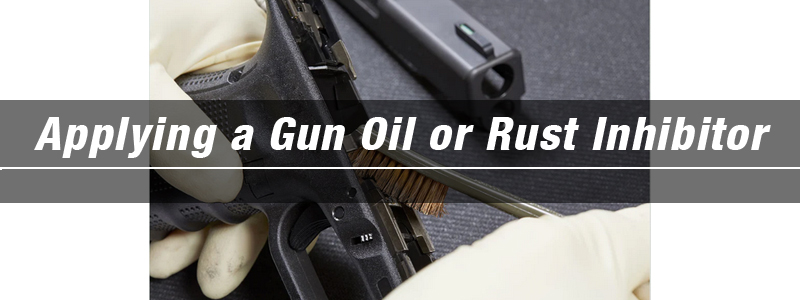
Applying a gun oil or rust inhibitor is essential in preventing rust on your firearms. Gun oils and rust inhibitors are designed to create a protective barrier that prevents moisture and oxygen from contacting the gun's metal components, ultimately leading to rust formation. Various gun oils and rust inhibitors are available, each with unique properties. It's important to choose a product compatible with your firearm type and follow the manufacturer's instructions. Before applying the product, cleaning the gun thoroughly to remove any waste is crucial. After cleaning, apply a thin layer of the oil or inhibitor to all metal parts of the gun, ensuring to cover them thoroughly. This will create a protective coating to help prevent rust formation and keep your firearm in excellent condition. Regularly applying gun oil or rust inhibitor is important in maintaining your firearm's longevity and reliability.
Using a Gun Safe
Using a gun safe effectively prevents rust on your firearms while providing secure storage to protect them from theft or damage. Despite the varying size, styles, and material composition, gun safes aim to deliver fast and safe storage for your firearms. A gun safe should be placed in a dry and secure location, such as a closet, basement, or garage, and anchored to the floor or wall for added security. By keeping your firearms in a gun safe, you can reduce the risk of rust formation by controlling the humidity and moisture levels around them. In addition to preventing rust, a gun safe protects against theft, unauthorized access, and accidental discharge. When choosing a safe weapon, it's essential to consider factors such as size, material, locking mechanism, and fire rating. Investing in a quality gun safe is a crucial step in ensuring the longevity and reliability of your firearms. Check best gun safe brands here.
Rotating Your Guns
Rotating your guns is an effective way to prevent rust formation on your firearms. When guns are left unused for extended periods, they are more susceptible to rust formation due to exposure to moisture and oxygen. By rotating your weapons and using them regularly, you can ensure that each firearm is well-maintained and reduces the risk of rust formation. By rotating your weapons, you also ensure they receive the necessary care and maintenance to maintain longevity and reliability. Additionally, by handling and using your guns regularly, you become more familiar with them, which can improve your shooting skills and safety practices. Rotating your weapons is important in maintaining your firearms' condition and reducing the risk of rust formation.
Also Check:- How to clean a Revolver In 7 Steps
How do I remove rust from my gun?
If you have noticed rust on your gun, removing it immediately is important to prevent further damage.
- Disassemble your gun: Before cleaning the rust, disassemble your weapon to access all the affected parts.
- To remove rust from your firearm, apply a commercial rust remover. Gently scrub the rust using a nylon brush or fine steel wool, avoiding abrasive materials that could scratch or damage the gun's finish.
- Rinse and dry: Rinse the gun with clean water to remove any remaining rust remover, and then dry it thoroughly with a clean, absorbent cloth.
- Apply gun oil: After removing the rust, apply a light coat of gun oil to protect the gun's metal surfaces from further rust formation.
- Reassemble your gun: Once completely dry, reassemble it and ensure all parts are properly lubricated.
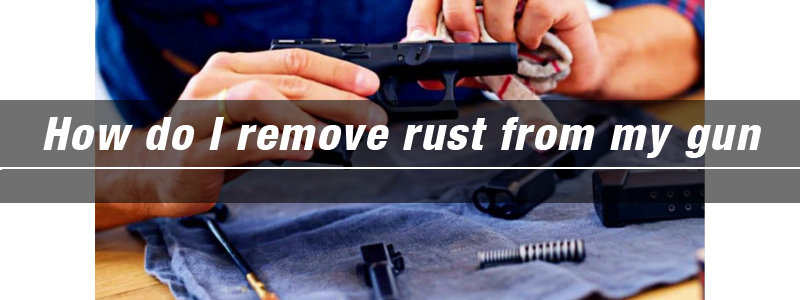
It's important to note that rust removal can be time-consuming and delicate, and it's best to seek professional help if you need more confidence in doing it yourself. Additionally, it's always better to prevent rust formation in the first place by storing your gun properly and using rust prevention methods.
Taking care of your firearms is a crucial aspect of responsible gun ownership to ensure they function correctly when needed. Rust and other damage can lead to serious internal impediments, compromising accuracy and, in turn, safety. Ensure you've got rust prevention on your firearm maintenance checklist to keep your guns pristine and safe.
